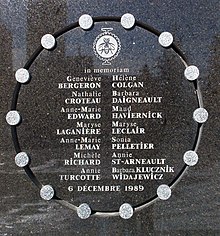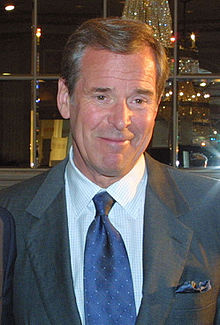Portal:Canada
| Showcase | Contents | Contributing |
Introduction
Canada is a country in North America. Its ten provinces and three territories extend from the Atlantic Ocean to the Pacific Ocean and northward into the Arctic Ocean, making it the world's second-largest country by total area, with the world's longest coastline. Its border with the United States is the world's longest international land border. The country is characterized by a wide range of both meteorologic and geological regions. It is a sparsely inhabited country of just over 41 million people, the vast majority residing south of the 55th parallel in urban areas. Canada's capital is Ottawa and its three largest metropolitan areas are Toronto, Montreal, and Vancouver.
Canada is a parliamentary democracy and a constitutional monarchy in the Westminster tradition. The country's head of government is the prime minister, who holds office by virtue of their ability to command the confidence of the elected House of Commons and is appointed by the governor general, representing the monarch of Canada, the ceremonial head of state. The country is a Commonwealth realm and is officially bilingual (English and French) in the federal jurisdiction. It is very highly ranked in international measurements of government transparency, quality of life, economic competitiveness, innovation, education and gender equality. It is one of the world's most ethnically diverse and multicultural nations, the product of large-scale immigration. Canada's long and complex relationship with the United States has had a significant impact on its history, economy, and culture.
A developed country, Canada has a high nominal per capita income globally and its advanced economy ranks among the largest in the world, relying chiefly upon its abundant natural resources and well-developed international trade networks. Recognized as a middle power, Canada's strong support for multilateralism and internationalism has been closely related to its foreign relations policies of peacekeeping and aid for developing countries. Canada is part of multiple international organizations and forums. (Full article...)
Featured article -
The École Polytechnique massacre (French: tuerie de l'École polytechnique), also known as the Montreal massacre, was an antifeminist mass shooting that occurred on December 6, 1989, at the École Polytechnique de Montréal in Montreal, Quebec. Fourteen women were murdered; another ten women and four men were injured. (Full article...)
Featured biography -
Peter Charles Archibald Ewart Jennings CM (July 29, 1938 – August 7, 2005) was a Canadian-American television journalist, best known for serving as the sole anchor of ABC World News Tonight from 1983 until his death from lung cancer in 2005. Despite dropping out of high school, Jennings transformed himself into one of American television's most prominent journalists. (Full article...)
Selected panorama -
National symbol -
The North American beaver (Castor canadensis) is one of two extant beaver species, along with the Eurasian beaver (Castor fiber). It is native to North America and has been introduced in South America (Patagonia) and Europe (primarily Finland and Karelia). The North American beaver is one of the official national wildlife of Canada symbols and is the official state mammal of Oregon and New York. North American beavers are widespread across the continental United States, Canada, southern Alaska, and some parts of northern Mexico. (Full article...)
Selected vital article -
The history of Canada covers the period from the arrival of the Paleo-Indians to North America thousands of years ago to the present day. The lands encompassing present-day Canada have been inhabited for millennia by Indigenous peoples, with distinct trade networks, spiritual beliefs, and styles of social organization. Some of these older civilizations had long faded by the time of the first European arrivals and have been discovered through archeological investigations. (Full article...)
Selected picture -
Credit: Library of Congress Prints and Photographs Division. Brady-Handy Photograph Collection.
Current events
- September 9, 2024 –
- Finnish-Canadian sportswear mogul Peter Nygård is sentenced to 11 years in prison for sexual assault. (CBC News)
- September 4, 2024 –
- In Canada, New Democratic Party leader Jagmeet Singh announces that he has terminated the confidence and supply agreement his party made with Prime Minister Justin Trudeau's Liberal government in 2022. (CBC News)
- August 27, 2024 – Canada–Mexico relations, Mexico–United States relations
- Mexico suspends all interactions with the Canadian and American embassies in Mexico City due to claimed interference with its independence and internal affairs after both ambassadors criticized reform plans for members of the judiciary, up to and including Supreme Court justices, to be elected by popular vote. (Reuters)
- August 26, 2024 – Canada–China relations
- Canada announces a 100% tariff on imports of Chinese-made electric vehicles and a 25% tariff on Chinese steel and aluminum. (AP)
- August 22, 2024 – 2024 Canada railway shutdown
- Canadian National Railway and Canadian Pacific Kansas City lock out roughly 10,000 unionized railroad workers in Canada, leading to a railway stoppage that impacts many North American supply chains and may cost the economy of Canada C$341 million per day. (Reuters)
- In response to the railway stoppage, Canadian labour minister Steven MacKinnon refers the two disputes to binding arbitration. (CBC News)
Did you know -

- ... that the Saskatchewan Conservation House, built in 1977 to withstand Canadian winter temperatures, did not use a furnace?
- ... that a journalists' poll rated Billy Fitzgerald the second-best Canadian lacrosse player of the first half of the 20th century?
- ... that journalist W. A. Hewitt refereed the first game played in the history of ice hockey at the Olympic Games?
- ... that in one year, a team of Canadian All-Stars twice played against the U.S. college football national champion and came within one point of winning each game?
- ... that a year after becoming the first woman president of the Canadian Political Science Association, Caroline Andrew moderated the first Canadian leaders' debate on women's issues?
- ... that jazz singer Judi Singh's mother and father were, respectively, among the earliest Black and Sikh settlers of Alberta, Canada?
- ... that the Canadian Night Watchman was the first operational radar system in North America?
Featured list -
The Vanier Cup (French: Coupe Vanier) is a post season university football championship game, used to determine the national champion in U Sports football. The game is the final for the winners of the Uteck Bowl and the Mitchell Bowl. In turn, the participating teams are determined by the winners of 4 bowl games: the Loney Bowl (AUS), Hardy Cup (Canada West), Dunsmore Cup (RSEQ), and Yates Cup (OUA). (Full article...)
Main articles
Associated Wikimedia
The following Wikimedia Foundation sister projects provide more on this subject:
-
Commons
Free media repository -
Wikibooks
Free textbooks and manuals -
Wikidata
Free knowledge base -
Wikinews
Free-content news -
Wikiquote
Collection of quotations -
Wikisource
Free-content library -
Wikiversity
Free learning tools -
Wikivoyage
Free travel guide -
Wiktionary
Dictionary and thesaurus
































